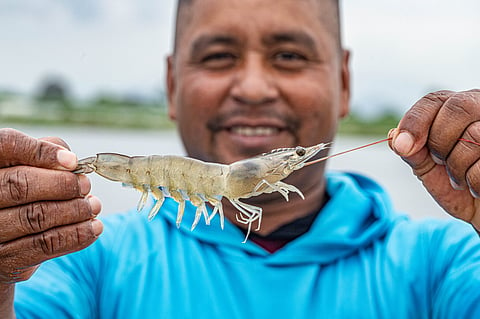

SSP is leading a pioneering initiative in shrimp aquaculture to transparently assess whether workers on shrimp farms are paid a living wage.
Photo: Sustainable Shrimp Partnership.
The Sustainable Shrimp Partnership (SSP) has launched a project to, using comparable data and recognized methodology, measure and validate that workers on SSP shrimp farms in Ecuador receive a living wage.
In collaboration with IDH - an international foundation that brings together public and private stakeholders to make global agricultural markets more sustainable and inclusive - with this initiative, SSP sets a new benchmark for social responsibility in shrimp aquaculture, making Ecuador a pioneer in measuring living wages in shrimp production.
"Accurately measuring living wages — using real-world data — is a crucial step towards ensuring fairer labour conditions. It allows us to pinpoint specific gaps and, most importantly, provides a solid foundation for meaningful action," explained Marjol van der Linden, Programme Manager for Aquaculture at IDH.
"This experience in Ecuador offers valuable insights for other seafood sectors aiming to embed social criteria into their sustainability efforts," van der Linden added.
The program, which was inaugurated on June 11 in Guayaquil, one of the main centers of the shrimp industry in the country, aims to ensure that the workforce of participating companies earns sufficient income to lead a dignified life with their families.
Through IDH’s Salary Matrix, a digital platform based on the Anker methodology, SSP members will be able to compare the actual wages they pay with the estimated living wage value for their region. The system allows them to identify whether wages are below, meet, or exceed that threshold, providing a technical basis to support compliance with fair labor conditions.
"Today, SSP members are making history," SSP Director Pamela Nath said at the inauguration. "Once again, we reaffirm that the well-being of the people who make the production chain possible not only can, but must be a priority."
"We continue to demonstrate that it is possible to offer premium-quality shrimp, compete in the most demanding markets, and at the same time adhere to the highest social and environmental standards," she added.
"This measurement will allow us to support that commitment with concrete and verifiable evidence, raise the sector's social standards, and inspire more actors in aquaculture to join this race to the top," she concluded.
Leading by example in shrimp farming has been a strategic foundation of the Sustainable Shrimp Partnership since the business organization began its journey seven years ago to transform the future of shrimp aquaculture in Ecuador.
SSP explained that the decision to move forward with this initiative came after a pilot project carried out in 2023 in coordination with IDH and the Aquaculture Stewardship Council (ASC), the results of which showed that several Ecuadorian farms not only met, but even exceeded the living wage threshold estimated for the southern coastal region of the country.
This was also highlighted by the Executive President of Ecuador's National Chamber of Aquaculture (CNA), José Antonio Camposano. "The Ecuadorian shrimp industry complies with both national labor regulations and international standards, which facilitates the implementation of this type of tool, " he said. "It is an opportunity to demonstrate, through systematic and measurable practices, that the country is ready to lead the social standard in aquaculture."
The initiative comes at a key moment, after last month the Southern Shrimp Alliance (SSA) asked the U.S. Department of Commerce to investigate what they consider to be Ecuador's government benefits granted to the Ecuadorian shrimp industry after seeing what they consider to be evidence of irregularities, including suspected forced labor practices.
Although it does not refer to this suspicion, SSP does conclude its note by saying that, with this action, the organization and its members reinforce their purpose, incorporating a verifiable social dimension to a strategy that already contemplates high social, environmental, quality, and traceability standards.
